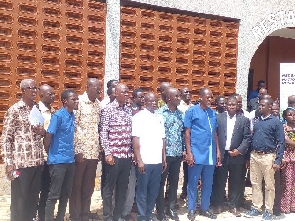Stakeholders including MMDCEs of Akatsi North and South and Ketu North Districts of the Volta region have received a one-day capacity enhancement on National Export Development Strategy (NEDS), a 10-year plan by the government to generate more revenue from non-traditional exports (NTEs). The stakeholders were also schooled on the African Continental Free Trade Area (AfCFTA), One District, One Exportable Product (1D1EP), and the mandate of the Ministry of Trade and Industries. At the workshop held on Monday, October 24, 2022 at Dzodze, stakeholders were urged to use NEDS as a roadmap to the realization of AfCFTA. All these form part of the government's efforts to raise some 25.3 billion US dollars through non-traditional exports (NTEs) by 2029. Speaking to the media on sides of the workshop, Volta and Oti Regional Director of Ghana Export Promotion Authority (GEPA) Mr. Chris Amponsah Sackey said AfCFTA will minimize challenges traders face in trading among African countries and that will also help grow Ghana and Africa's economy at large hence Ghanain businesses must take advantage of AfCFTA. He reiterated the need to stop exporting raw materials only "We want to add value to the raw materials that we have before we export them because we've realized over the years that we are not getting much from non-traditional export because we always export raw materials", this he said to enable the government to raise the targeted 25.3 billion by the deadline, 2029. Under the NEDS, government wants to prioritise some products, Cocoa, Cashew, Horticultural products, Yam, Oil palm products, Coconut, Shea, fish, and fishing products, Apparel, Aluminium products, Natural rubber, Petrochemicals, petroleum products, services, automobile and vehicle parts, industrial salt, pharmaceutical, etc. Each district at the workshop identified one exportable product out of the focused products, the government through GEPA and its relevant agencies will prioritise the identified product in each of the districts and put it in the international market. The beneficiary districts are all farming-dominated areas and for the participants, farming inputs are costly hence the need for government to stabilize it in order to also invest more locally in the agric sector since it is the backbone of the realization of NEDS and NTEs.
Regional News of Tuesday, 25 October 2022
Source: Albert-Gooddays Kuzor













